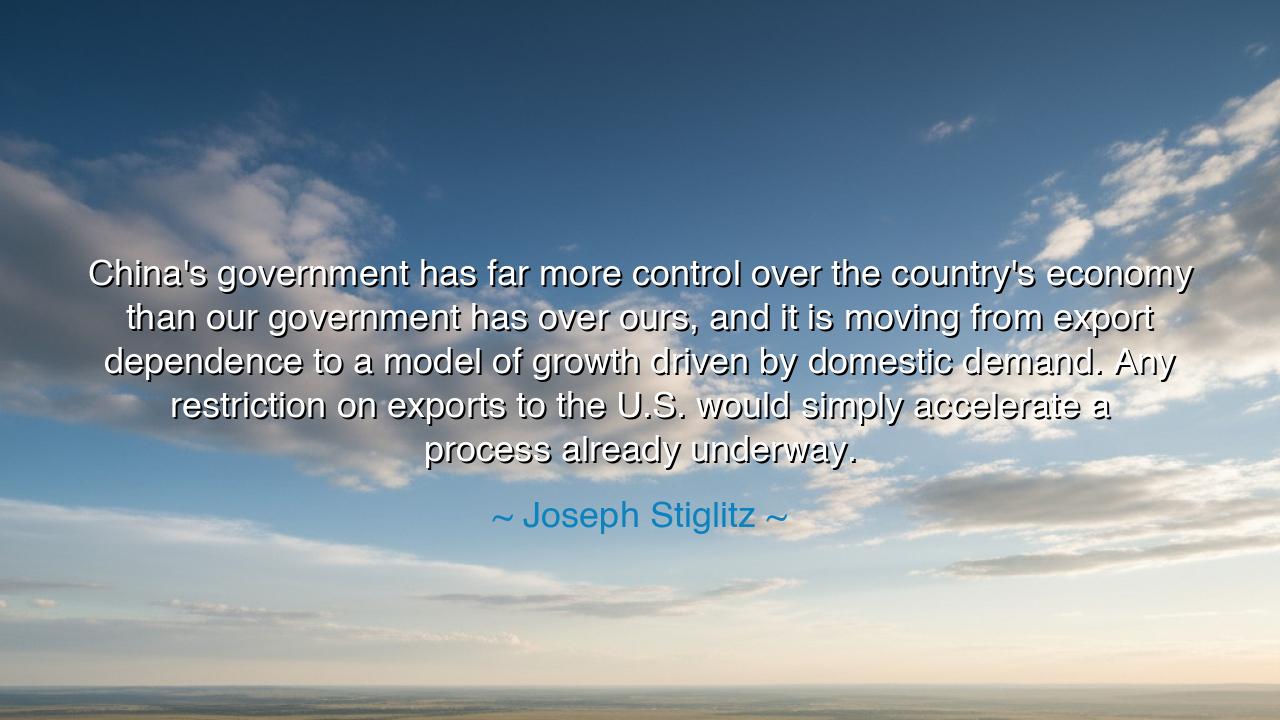
China's government has far more control over the country's
China's government has far more control over the country's economy than our government has over ours, and it is moving from export dependence to a model of growth driven by domestic demand. Any restriction on exports to the U.S. would simply accelerate a process already underway.






In the solemn yet discerning voice of wisdom, Joseph Stiglitz, the Nobel laureate and thinker of economies, spoke these words: “China's government has far more control over the country's economy than our government has over ours, and it is moving from export dependence to a model of growth driven by domestic demand. Any restriction on exports to the U.S. would simply accelerate a process already underway.” These are not merely the reflections of an economist—they are the measured insights of a sage observing the tides of history. Within this statement lies both revelation and warning: a lesson about power, adaptation, and the invisible engines that drive nations. Stiglitz calls us not only to look at the numbers that define trade, but to understand the forces of will, vision, and policy that shape the destiny of peoples.
To grasp the meaning of this quote, one must see beyond the surface of commerce and peer into the soul of governance. Stiglitz contrasts two worlds—the commanding statecraft of China, where the hand of government guides every river of the economy, and the market freedom of the United States, where private forces shape the nation’s prosperity. In China, the government stands not as a bystander, but as a conductor—directing industries, controlling capital, and shaping long-term plans with deliberate intent. In America, by contrast, power is diffused, decisions are left to the interplay of markets, and the government’s role, though mighty, is often reactive rather than directive. Stiglitz does not praise one nor condemn the other; he merely observes a truth that the wise must recognize: that control and coordination can yield both strength and rigidity, while freedom and decentralization bring innovation but also vulnerability.
The origin of this insight lies in the shifting landscape of the early twenty-first century, when the balance of global power began to move eastward. For decades, China had built its wealth upon exports, supplying the world with goods while relying on foreign demand to fuel its growth. Yet as the world changed—through crises, tariffs, and rising labor costs—China began to turn inward, seeking strength not from others, but from itself. Domestic demand, as Stiglitz noted, became the new pillar of its growth: a transformation from dependency to self-sufficiency. Thus, when Western nations threatened to limit Chinese exports, Stiglitz saw the irony—such restrictions would not weaken China but hasten its evolution. Like the pruning of a tree, adversity would only strengthen its roots.
History, too, provides an echo of this wisdom. In the years following the Second World War, another nation—Japan—rose from ruin by mastering export-led growth. Its industries filled the world with steel, automobiles, and electronics. Yet when trade pressures and currency adjustments came in the 1980s, Japan struggled to shift its economic model inward. Its people had been trained to build for others, not consume for themselves. The lesson Stiglitz draws from this past is clear: the nations that endure are those that adapt—those who transform challenge into opportunity, turning the external into the internal, the foreign into the familiar. China, he saw, was doing precisely that.
There is also a deeper truth within this observation—one that speaks not only to nations, but to the hearts of individuals. Every society, like every soul, passes through stages of dependence and independence. The young seek strength from others, trading their labor for guidance; but maturity comes when one learns to sustain oneself, to find within one’s own people—or within one’s own spirit—the wellspring of growth. China’s shift from export to domestic demand is not merely an economic strategy—it is a metaphor for sovereignty, for self-reliance, for the ancient truth that no house stands strong forever upon borrowed foundations. Stiglitz, in his wisdom, reminds us that even great powers must eventually turn inward, mastering themselves before they can master the world.
Yet his words also carry a subtle warning to his own nation. America, long the champion of open markets and free trade, risks blindness if it underestimates the resilience of others. To impose restrictions upon another nation, believing it will weaken them, is to misunderstand the alchemy of struggle. For history shows that the fires of adversity forge the strongest steel. When one door closes, the wise build another. And so, as Stiglitz foresaw, the very barriers meant to contain China’s growth may instead hasten its independence, strengthening its industries, its consumers, and its vision of economic destiny.
Therefore, my children of commerce and conscience, heed this teaching well: in every age, the balance between control and freedom, between cooperation and competition, shapes the fate of civilizations. The lesson is not merely for nations, but for all who seek power and purpose. Those who govern must learn that strength lies not in domination, but in adaptation. Those who trade must remember that prosperity born of harmony lasts longer than that born of conflict. And those who build must know that true growth begins within—whether in the heart of a nation or the heart of a man.
And so, let the wisdom of Joseph Stiglitz echo through the halls of policy and the chambers of thought: the forces that shape the world cannot be contained by tariffs or decrees. They move as rivers do—finding new paths, carving new landscapes, and nourishing those who understand their flow. For the economy, like life itself, is ever-changing, and only those who move with wisdom, humility, and foresight will remain not merely prosperous, but free.






AAdministratorAdministrator
Welcome, honored guests. Please leave a comment, we will respond soon